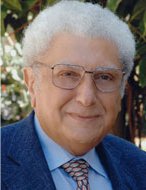
By: Maria A. Chhabria, Director of Academic Programs,
International Judicial Academy
M. Cherif Bassiouni is considered by many the father of
modern international criminal law. He has played a key role in the creation of
every major international criminal law instrument developed in the last
45 years including the Apartheid Convention, the Torture Convention,
and the Statute of the International Criminal Court. His writings, diplomatic
initiatives, and criminal investigations have contributed significantly to the
development of international criminal law as a distinct discipline within the
field of international law.
Professor Bassiouni was born in Egypt in 1937. At age 25 he
moved to the United States. He has studied and traveled around the world
has held numerous academic positions and has worked in the international field for
many organizations at regional and international level. Since 1975 he has held
numerous positions within United Nations institutions and was a consultant for the U.S.
Department of State and Department of Justice for issues related international
terrorism, and assisted the U.S. Department of State the during the U.S.
hostage crisis in Iran. Through his work for the U.N. Professor Bassiouni has
been in various countries plagued by war and has investigated crimes violating
international criminal law and human rights. As a member of the U.N. commission
for the investigation of the crimes in the former Yugoslavia, he had a major
role in documenting war crimes and in obtaining the recognition of sexual
violence against women as a crime against humanity. At that time he also
assisted in the creation of the International Criminal Tribunal for the former
Yugoslavia (ICTY), and later in the foundation of the International Criminal
Court. Regarding his work in the former Yugaslavia, Professor Bassiouni said in
a recent interview: “I’m in my 70s, I’m a Muslim, I come from the Arab World,
I’m from another generation. And yet I have to tell you, I’m absolutely shocked
and dismayed and amazed by the totally lack of sensitivity to the plight of
women in war, and particularly the raping of women, in war, after war, after
war, and how little attention is paid to it.”
As a war crime investigator, Professor Bassioni has been a
member of various commissions established to document war crimes and violations
of human rights. Most recently, he served as Chair of the Bahrain Independent
Commission of Inquiry established to determine whether the events that took place
in Bahrain from February 2011 constituted a violation of international human
rights. In 2004 he was selected as Independent Expert on Human Rights in Afghanistan. He was a member of the Commission of Inquiry for Libya.

 International
Judicial Monitor
International
Judicial Monitor